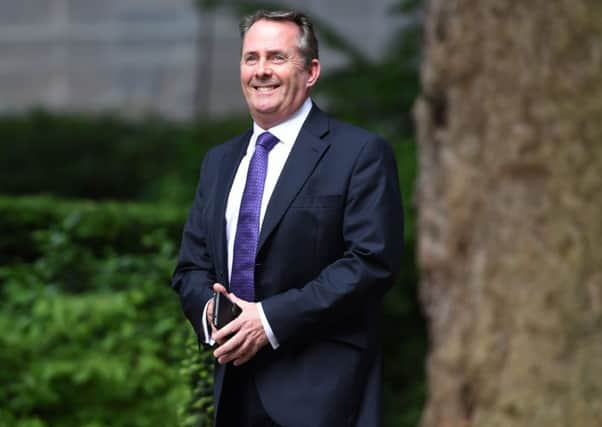YP Comment: New '˜special relationship' - Trade talks begin with the US


Though European Union rules stipulate that the UK cannot sign a deal until after it has left the EU, the discussions will pave the way for a future potential free trade agreement. As a single country, the United States is the UK’s largest trading partner and Dr Fox was upbeat, talking about this ‘unprecedented opportunity’ to cement the economic bond between the two countries.
However, not everyone shares his optimistic outlook. While Dr Fox was in the US the uncertainty surrounding the UK’s economy deepened as the International Monetary Fund (IMF) downgraded its growth forecast for the UK after a weaker-than-expected economic performance.
Advertisement
Hide AdAdvertisement
Hide AdIn its latest World Economic Outlook, the organisation said it expects Britain’s economy to grow by 1.7 per cent, down from its 2 per cent prediction in April. It’s not the news Dr Fox and Theresa May would have wanted to hear and contrasts with countries such as Germany, France and Spain, where growth has exceeded expectations.
However, nothing has really changed. It remains imperative that the Government secures the best possible deal with its EU counterparts and lays the groundwork for similarly productive deals around the world.
Last year Barack Obama said the UK would be “at the back of the queue” if it quit the EU, and while the former US President’s comments were ill-advised and shown to be patently untrue, we cannot expect complex trade negotiations to go without a hitch.
Compromises will have to be made if this is to be a prosperous new chapter in our ‘special relationship’ with the United States, and the same applies to our EU talks.
Charlie’s sad case - Brave parents end legal battle
Advertisement
Hide AdAdvertisement
Hide AdFew recent stories have been as heart-rending as that of 11-month-old Charlie Gard and the sight of his parents – Chris Gard and Connie Yates – standing on the steps outside the High Court as Mr Gard, choking back tears, read out a statement explaining why they have ended their legal fight over treatment for their terminally ill baby son, was deeply moving.
It’s a story that has divided public opinion and is mired in controversy. Charlie suffers from a rare inherited disease – infantile onset encephalomyopathy mitochondrial DNA depletion syndrome (MDDS) – and doctors at Great Ormond Street Hospital (GOSH), where Charlie has been treated since October, have argued that his quality of life won’t improve.
However, his parents wanted him to be given an experimental treatment in the United States. They lost battles in the High Court and Court of Appeal and failed to persuade European Court of Human Rights judges to intervene.
It is difficult to imagine their pain but there is another troubling aspect to this deeply distressing case and that is the level of vitriol and abuse aimed at hospital staff where Charlie is being treated.
Advertisement
Hide AdAdvertisement
Hide AdOur doctors and nurses are among the best, and most caring, in the world and for them to be bombarded with death threats is disgraceful. Such behaviour does nothing to help his distraught parents who now face the anguish of saying goodbye to their little boy before his first birthday.
They must be allowed to grieve and Charlie, whose tragically short life has been played out in the spotlight, must be allowed to die with dignity surrounded by the love of his family.
Safety in the sea - RNLI launch summer campaign
The summer holidays are here and that means families make a beeline for the coast.
We all enjoy a day out at the seaside and as the weather gets warmer more people are tempted to go for a swim. Which is why the Royal National Lifeboat Institution (RNLI) and the Maritime and Coastguard Agency (MCGA) are reminding people to be careful when going into the water.
Advertisement
Hide AdAdvertisement
Hide AdAround 165 people drown off Britain’s coast each year and the RNLI quite rightly advises visitors to check local information about strong currents and tides before taking a dip.
The men and women of the RNLI provide a crucial lifeline, often putting their lives on the line to help save others, and we can do our bit to make their job a little easier by not taking unnecessary risks.
These unsung heroes and selfless volunteers deserve our unwavering support and gratitude. So next time you see an RNLI collection tin, be sure to make a contribution.